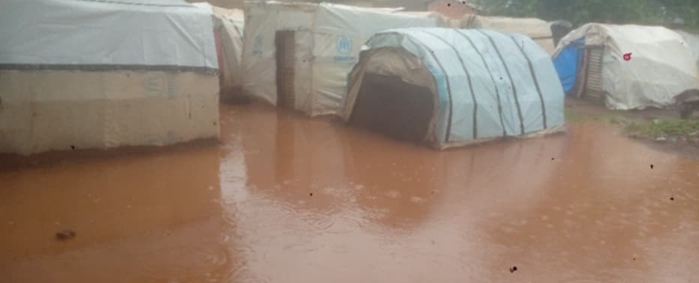Severe flooding has displaced over 17,000 internally displaced persons (IDPs) in Tambura County, Western Equatoria State, following torrential rains that destroyed shelters and heightened the risk of disease outbreaks.
Tambura County Commissioner Mathew Mabenge confirmed to Radio Tamazuj Monday that the flooding, triggered by heavy rains on Sunday night, devastated temporary IDP shelters across the county.
“All the small huts made from local materials have collapsed, and people are sleeping in the open,” he said. “The situation is dire, especially for young children, pregnant women, and the elderly.”
“We urgently need food, medicine, non-food items, and shelter materials. People have lost everything,” Mabenge added.
He also said they need agricultural tools and seeds to help residents restart their lives.
In the Barracks Camp, one of the hardest-hit areas, residents described the flooding as the worst they have experienced since fleeing their homes due to conflict.
“It has been five years in this camp, but this flooding is the worst,” said Helen Mario, a mother of four. “We are like fish in the water. Roads are impassable, tents are gone, and there is no food or medicine. Children are vomiting, and we cannot even light a fire to cook. It is a disaster.”
At the UNMISS camp, where many IDPs sought refuge at the height of the conflict, conditions are rapidly deteriorating.
“We thank God we are alive, but we have nothing-no soap, no salt, and the cold is too much for the elderly,” said Ida Inasio Kazima, a longtime IDP. “The shelters are too old and weak to withstand this kind of rain.”
Edward Nafoni Miniala, another displaced resident, expressed frustration with the lack of response to their repeated pleas.
“We have raised our voices, but no help has come. Everyone is living in water now,” he lamented. “The elderly are suffering, and we feel forgotten.”
Health concerns are escalating as medical facilities struggle to respond to the growing number of cases linked to the flooding.
“We are seeing many patients with vomiting, diarrhoea, and respiratory infections like pneumonia,” said Dr. Gabriel Esinayto, Medical Director at the camp clinic. “There is a serious risk of a cholera outbreak if no immediate intervention is made. We are overwhelmed.”
The local authorities, alongside humanitarian workers, are calling for swift action to avert a full-scale humanitarian crisis in Tambura County.




